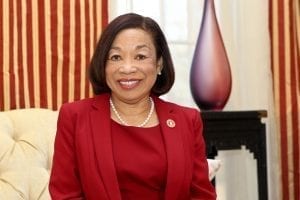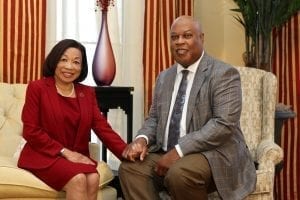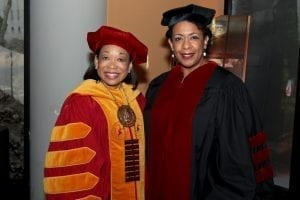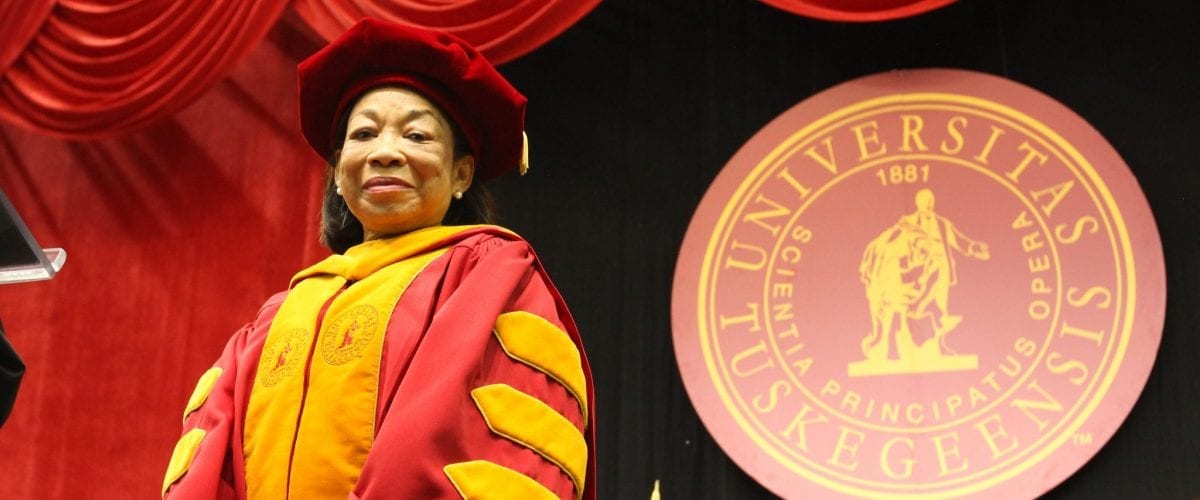Cover Story

“We know that in all things God works for the good of those who love him, who have been called according to his purpose,” says Tuskegee University President Dr. Lily McNair, quoting Romans 8:28. “I think about that so much. It’s been so important to help me deal with difficult situations and also to help me to deal with my own growth, professionally and personally.”Tuskegee University’s first female president, McNair’s growth has included a move from New York to Alabama, and stepping into leadership of a historically black university. She holds in reverence the legacy of those who came before her to make an impact on access to higher education for all. Tuskegee University was founded in 1881 with 30 adult students in a one-room shack near Butler AME Zion Church in Tuskegee, Ala., with Booker T. Washington as its founding principal. When Washington died in 1915, the school had 200 faculty members; 1,500 students; and 40 trades (majors). He left a heritage of leadership best described in an inscription on the Lifting the Veil of Ignorance Monument on campus: “There is no defense or security for any of us except in the highest intelligence and development of all.” Inaugurated in March 2019, McNair celebrates new programs and community relationships that continue Washington’s vision and reflects on an upbringing that helps her see God’s blessings in her life today.

McNair’s strongest memories of childhood are of the beauty of diversity. She grew up in a small town outside of McGuire Air Force Base in New Jersey, and many of her friends had fathers in the military and mothers who were Asian, Korean, Filipino, Puerto Rican, or German. “You can think about the military travels of men, and they’ve met their wives all across the globe. That’s what my life was like,” she recalls, adding that the community also included differences in faith practices. McNair’s mother was Japanese, her father African American. Her mother’s religious background was Buddhism, and while they did not attend church, her father would open the Bible for Sunday School lessons at home. McNair admits that as she matured, at times the differences in religious teaching in her home led to conflict with her mother, but it also led to great acceptance. “She always asked us to explore whatever we thought was best for us. She never had any parameters or requirements of how we’d try to lead our lives in a religious fashion.”
A commitment to Christianity for McNair came after marriage. She received her undergraduate degree from Princeton University in 1979 and met her husband, Dr. George W. Roberts, while they were both graduate students at the State University of New York at Stony Brook, now known as StonyBrook University. He studied social psychology, and she studied clinical psychology. “The wonderful thing about being married to someone you meet in graduate school is they know what your life is like. They know what it means to write a dissertation, teach classes, grade papers, and so on and so forth,” she recalls. “We could share that together.” The couple also decided to share their faith. Roberts was raised in the Baptist church, McNair was baptized after their wedding, and each of their children were dedicated in Baptist ceremonies. When her children were young, they lived in Atlanta, Ga., where she worked as associate professor of psychology and associate director of the Clinical Psychology Doctoral Training Program at The University of Georgia. Daughter Marguerite was involved in dance until age 14, and son Randall enjoyed acting. Both played the piano and sang in a church youth choir.McNair admits that as a mother, she encouraged participation in the arts but was careful to refuse access to media that objectified women. “I was the kind of mom that said if it’s rated R, you’re not watching it. My kids hated it! They hated it. And this is when music videos were coming out, and it if it had anything to do with stereotypic image of women, they weren’t watching it,” she remembers. “That’s how we trained them. I think that now they are very thankful about that because I hear them saying the same thing that I used to say 15 years ago.”

McNair says her faith impacts her role in academic leadership in that it enables her to see the blessings not just in her new position but in her experiences and interactions on campus as well. “When I think about the expectations of being a university president, I feel that not only have I been blessed to have been able to earn this position, but I feel like I’ve been blessed since I’ve been here. Things have happened that I look around and I go, ‘Wow. That fell into place. That’s incredible.’ Sometimes things happen and there’s no other reason than God looking down and saying, ‘I think I’m gonna help Lily out right now.’ That’s very important to me,” she explains.
Prior to joining Tuskegee University, McNair served as provost and senior vice president for academic affairs at Wagner College in New York City. Committed to making sure every student who desires a quality college education has access to one, under McNair’s leadership, Tuskegee University has launched the Campaign for Leadership Excellence, with a goal of raising $1 million to support scholarships. Tuskegee University has also entered into an agreement with Ross University Schoolof Medicine in Barbados to increase the number of African-American students who become physicians. Qualified Tuskegee students receive a scholarship covering full tuition for the first semester. “Having a higher ed experience really exposes people to different ways of learning, different ways of looking at the world, different ways of understanding and working with people who are different from them, different ways of working with communities,” she says. “All of this combined with the academic major that they are becoming very skilled in helps people to really become who they are and it helps them to make a mark in their communities.”

The first female president of the institution in Tuskegee University’s 138-year history, McNair recognizes the legacy of leadership on campus that began with the appointment of Booker T. Washington in 1881. Washington’s work with fellow freed slave Lewis Adams to provide education to African Americans in post-slavery Alabama is a miracle story, she says. It was courageous to reach out for financial backing to build what would become a historically black university less than 20 years after the Emancipation Proclamation. “Tuskegee University has really made a mark on our country’s history and the history of education for African Americans. There are many students here who say that they are 4th and 5th generation Tuskegee students. It’s that deep history and that legacy that really resounds with my sense of what higher education does. It exposes people to different ways of looking at the world, learning about the world, and prepares people to go out and really make a change in the world.”
- Camille Smith Platt








